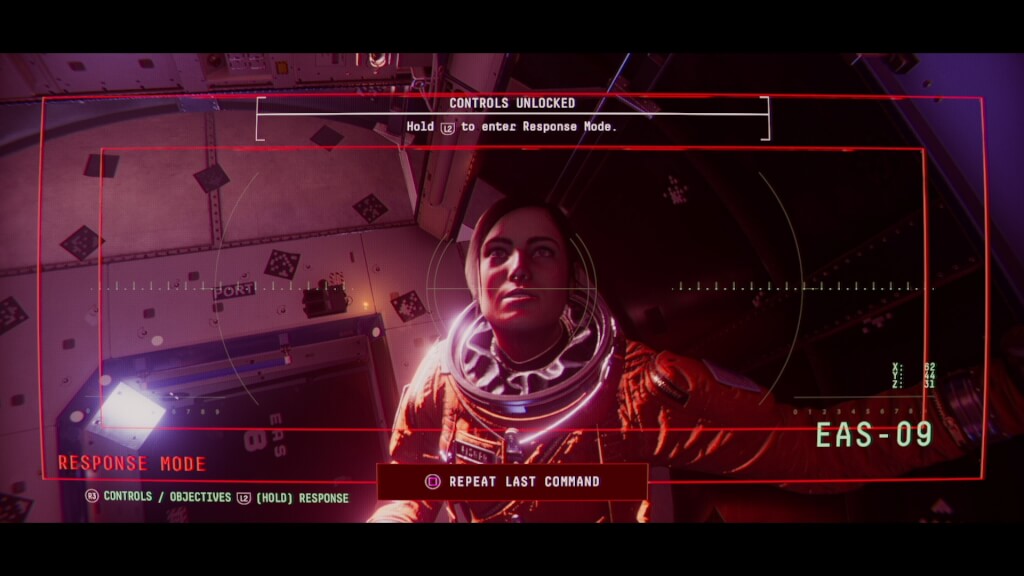When a mysterious disaster strikes, Emma Fisher is one of a handful of astronauts aboard the space station Observation. Unable to establish communications with the rest of the crew, Emma must rely on the station’s AI, SAM, to survive and to unravel the mystery of what happened.
Cinema has seen a rising trend in intelligent science fiction over the last few years; spearheaded by the likes of Christopher Nolan (Inception, Interstellar) and Denis Villeneuve (Arrival, Blade Runner 2049). Video games have dabbled in these sorts of stories in one form or another, with games like Prey and Oxenfree pushing the boundaries of science fiction narratives. Observation is definitely doing more than dabble. From developer No Code (Stories Untold) and a team with many links to 2014’s Alien: Isolation, Observation is both a chillingly effective science-fiction mystery game and a thoughtful examination of the perspective of the “other” in our future.

To deal with the functional first, Observation plays like a first-person puzzle game. The player takes on the role of SAM, the space station’s AI, and, initially at least, they must help Emma fix the station and find out what happened to the rest of the crew. Every module of the station has cameras that SAM can leap into, both to see what’s happening and to wirelessly hack into laptops and systems within those modules. Much of the gameplay in Observation involves leaping from module to module, examining different camera angles and rooting around for these connections that will solve whatever crisis is currently transpiring.
These system interactions take the form of mini-games; ranging from calibrating magnets to stabilise a containment field in a fusion reactor to scanning hazy scanner images for the co-ordinates of other astral bodies. The design of these mini-games is delightful, with each feeling like an only slightly gamified, simplified version of what they might be in real life. A consequence of this can be that they lack challenge. Honestly, more often than not, the challenge is in understanding the interfaces rather than puzzling out the solution. That is no bad thing, it lends the whole game a level of immersion that is both commendable from a design perspective and adds to the story, never once taking the player out of the moment.

These sections of voyeuristic camera-squatting are split by more exploratory moments of gameplay. As well as jumping into the CCTV on the station, SAM can possess floating spheres that allow the player to move around the station freely, as well as outside the station, and access areas that the cameras cannot see. These segments also provide a jolt of a more survival-horror feel as they are a fully first-person perspective in an exceedingly dark and creepy atmosphere. The game as a whole has a very menacing feel and the atmosphere is impeccably observed. Massive credit must go, here, to Omar Khan and Robin Finck for audio work. The pair deliver not only a tense, chilling score but incredible sound design that contribute immensely to the unparalleled immersion of Observation. In case any of this is worrying the more faint-hearted among us, I should clarify at this point that I, personally, am not a fan of horror games particularly and Observation is not a horror game. It is creepy, chilling, tense and atmospheric but there are no cheap jump scares or anything of that ilk here.
As the game goes on, and the story gets weirder and more engrossing, it becomes hard to stop playing Observation. The entire game took me about six hours to play, including some dilly-dallying checking nooks and crannies for the optional voice recordings that add flesh to the bones of the interpersonal relationships of the crew of the Observation. I finished the game across two sittings on the same day and it would benefit from being played in two or three longer sessions to allow the game’s atmosphere to really get its hooks into you. If six hours feels short to you then worry not, it feels pretty much spot-on in the context of the gameplay and the story.

Personally, I find it hard to pick much in Observation to criticise. Certainly it won’t be for everyone and if the sound of a mini-game and exploration-based approach to gameplay doesn’t excite you then maybe this isn’t the game for you. Having said that I’m going to doff my most pretentious hat here and suggest that Observation is not something that you take on for the gameplay but for the story and the experience. I appreciate that kind of narrative game experience isn’t for everyone but anyone who enjoyed the likes of Stanley Parable, Gone Home, What Remains of Edith Finch or Virginia will be in good hands here; albeit the genre and feel is very different from those examples.
I have no hesitation in giving Observation the seal of approval for anyone but those people for whom the entire genre holds little appeal. It is an excellent example of its type and can stand head and shoulders with the best science fiction stories ever told through the medium of video games. This review is fairly short, mostly because I don’t want to give away any of the narrative twists and turns but please do not mistake that brevity for a lack of depth on the game’s part. Observation is an essential experience for fans of narrative video games and for science fiction fans in general.
Observation is available now for PC on Steam after a year of exclusivity on the Epic games store. It is also available on PS4.